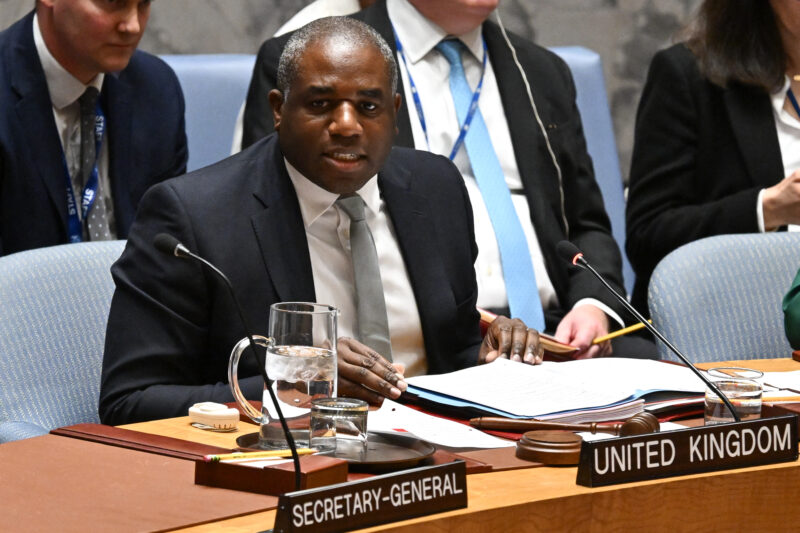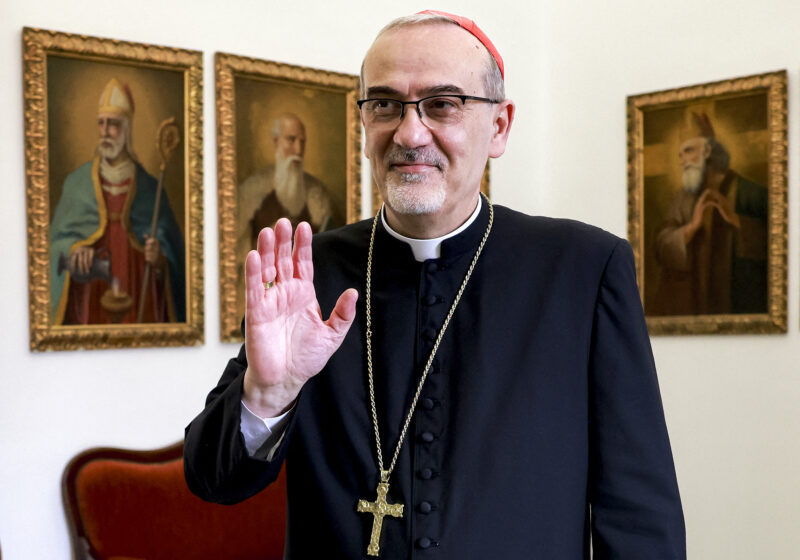House Democrats will ‘lean in on our strong support’ for Israel, Jeffries says following Israel trip
The House minority leader led a group of members to Israel and Ghana on his first foreign trip as the top House Democrat
Photo by Alex Wong/Getty Images
U.S. House Minority Leader Rep. Hakeem Jeffries (D-NY) takes questions during a weekly news conference at the U.S. Capitol on April 28, 2023 in Washington, DC.
House Democrats emphasized while in Israel that they “are going to continue to lean in to our strong support for a Jewish and democratic state,” newly appointed House Minority Leader Hakeem Jeffries (D-NY) told Jewish Insider after leading a group of Democratic leaders on a delegation to the Jewish state in late April.
In addition to the new Democratic leader, the delegation included the ranking members of the House Foreign Affairs Committee and its Middle East, North Africa and Central Asia subcommittee, the chairs of the Congressional Black and Hispanic caucuses, several members of the Democratic leadership team and the co-chair of the Problem Solvers Caucus — a group that Jeffries said “reflected the broad diversity of the House Democratic Caucus, but spoke with one voice, that we valued the special relationship between the United States and Israel.”
Rep. Josh Gottheimer (D-NJ), who traveled with Jeffries and is visiting the region again this week with House Majority Leader Kevin McCarthy (R-CA), told JI, “The fact that you had such a strong showing of support from senior leadership in the Congress, while others are trying to drive a wedge [in] the U.S.-Israel relationship, that to me is the key takeaway.”
In discussion with Israeli leaders including Prime Minister Benjamin Netanyahu, President Isaac Herzog, Knesset Speaker Amir Ohana and Opposition Leader Yair Lapid, the group touched on Iran, Israeli-Palestinian peace, security cooperation and the Abraham Accords, and raised concerns about the proposed judicial overhaul.
Jeffries said that the discussion on the judicial proposal was “anchored in… our shared democratic values” and that Israeli leaders understood “why the subject was raised and why there were significant concerns that had been expressed by many within the Jewish community in the United States.”
The House minority leader said he had also “made clear that the protests that were taking place in Israel are a sign of a vibrant democracy, and the fact that principles such as freedom of speech, freedom of expression, freedom of assembly and the right to petition your government to demand change were being respected in Israeli society and by the Israeli government. That is a hallmark of a democratic state.”
Rep. Nanette Barragán (D-CA) said that it “really stuck out to her” that there had been minimal violence or arrests throughout the protests — which she noted has not always been the case recently in the United States. “Sometimes when you have large amounts of people protesting in recent America, we’ve seen opposite responses,” she said.
Rep. Debbie Wasserman Schultz (D-FL) described the group’s conversations as “candid” and “very frank and productive,” adding that she was “glad” that she “got the sense that Israeli leadership have confidence that they can forge a compromise” on judicial reform.
“It seems like everyone is working assiduously to find a resolution,” Gotthemier agreed.
Jeffries unequivocally rejected comments made by some Democrats that proceeding with the judicial reforms in their current form could lead the U.S. to reconsider or condition its military aid to Israel, calling conditioning aid “a nonstarter.”
Gottheimer said the delegation also emphasized that “regardless of any issues in Israel, the relationship transcends [domestic Israeli politics] and remains special and ironclad.”
The group visited Israel amid a wave of terrorism targeting the Jewish state, including attacks carried out by Palestinians and renewed rocket fire from Hezbollah in Lebanon. According to Gottheimer, the group’s travels were delayed by a car-ramming attack during their visit.
The Democratic lawmakers said the attacks illustrate the necessity of continuing U.S. aid to Israel. Jeffries said Netanyahu specifically mentioned the importance of preserving collaboration between Israel and the Palestinian Security Services, which the U.S. has helped facilitate.
The group also discussed the long term stability of the Palestinian Authority, particularly the possible transition of power from 87-year-old Palestinian Authority President Mahmoud Abbas, who has ruled the PA since 2005, to new Palestinian leadership.
“There was real concern with respect to the uncertainty as to what that transition could look like,” Jeffries said. “But a clear understanding that in no circumstances can a transition to Hamas occur.”
Jeffries said that there was “widespread recognition” that the PA’s ability to maintain day-to-day services for the Palestinian people “would be essential.” He also said the group discussed “figuring out a way for some of the Gulf states to be able to increase their support for the Palestinian people… was a possible path toward stabilizing the political situation in the West Bank and foreclosing the possibility that a bad actor like Hamas could step into the vacuum.”
Wasserman Schultz added that expanding the Abraham Accords will, in the long term, help move the Palestinians toward a more positive and stable situation.
“The more Israel is able to reach agreements — with the work and assistance of the United States — with her neighbors around the region, I think it’s going to eventually bring about the realization among the Palestinians that time is marching on and that the benefits of having relationships with Israel far, far outweigh their commitments to blind hatred, and that that blind hatred is leaving them in an unnecessarily dire situation,” she said. “And so it’s incumbent upon the Palestinians to get their own act together.”
Jeffries said that the group “made clear… that we look forward to building upon the success of the Abraham Accords, and helping to facilitate broader communication, normalization and cooperation between Israel and its Arab neighbors.”
Netanyahu has been optimistic about the prospects of expanding the Accords to other Arab states, particularly Saudi Arabia, according to other lawmakers who traveled to Israel earlier this year.
Jeffries told JI that “there is real interest in trying to achieve normalization between Israel and Saudi Arabia, but there’s an understanding that that’s a work in progress and several additional steps are going to need to be taken to get to a place where that is possible.”
Gottheimer added that Saudi Arabia is tackling a range of “their own regional issues” at the moment “so obviously that complicates things for Israel.”
Normalization between Saudi Arabia and Israel, however, “would be a game-changing development,” Jeffries said.
The two-country trip, which started in Ghana, coincided with Israel’s memorial day for fallen soldiers and victims of terror. The group attended a commemoration event at Latrun, where Jeffries laid a wreath, and visited Yad Vashem: The World Holocaust Remembrance Center.
Wasserman Schultz said it was “incredibly moving” to hear from the families of fallen soldiers and victims of terror.
“To have Leader Jeffries lay a wreath during the ceremony and to be there together in solidarity with 7,000 people who are committed to, on one day, honoring Israel’s fallen and then, the next day, celebrating 75 years of Israeli independent continuity and recommitting to a free, democratic, Jewish State of Israel — it was an overwhelmingly emotional time,” she said.
Wasserman Schultz and Barragán both said they saw parallels between their experiences touring sites involved in the slave trade in Ghana and Yad Vashem in Israel.
“It really also fostered a shared understanding and commitment to eradicating the barbaric ways that we can treat one another,” Wasserman Schultz said. “That’s what was unique and special about this trip and the opportunity to travel with African American and Jewish members and experience the pain and persecution that one another’s people live through or died as a result of.”
Wasserman Schultz said that while in Ghana she was “struck” that the group’s local guide used the phrase “never again” — often invoked in Holocaust remembrance — to discuss the horrors of the slave trade. “At the end of the day, ‘never again’ needs to be ‘never again,’ for anyone and everyone,” Wasserman Schultz said.
Barragán said that beginning the delegation in slave dungeons in Ghana and ending it with Israel’s day of remembrance and a tour of a special exhibit at Yad Vashem “was really a full-circle moment for the trip, just to see the shared atrocities against two different cultures and countries.”
“It was a very moving trip for a lot of the members,” she said. “And it really reaffirmed why we support democratic countries and why we need to learn from the past and not allow it to happen again. So I think that was a huge takeaway from the trip that may get lost in the politics of the individual countries.”
The delegation also included Reps. Greg Meeks (D-NY), Yvette Clarke (D-NY), Steven Horsford (D-NV), Lizzie Fletcher (D-TX), Joe Neguse (D-CO), Dean Phillips (D-MN), Sara Jacobs (D-CA) and Stacey Plaskett (D-USVI).













































































